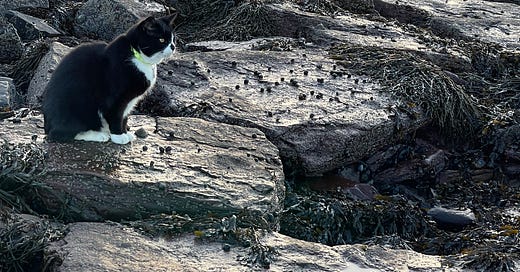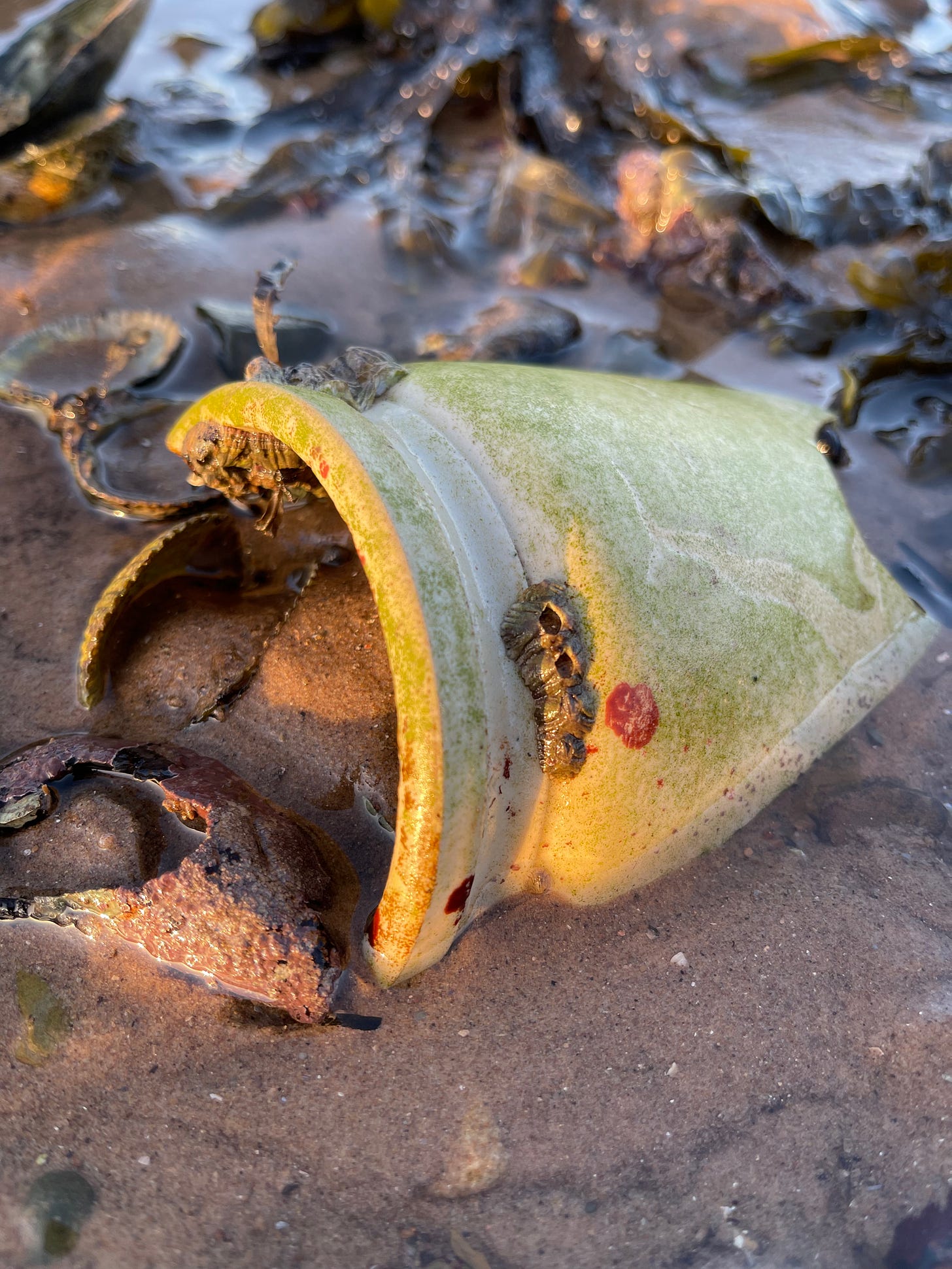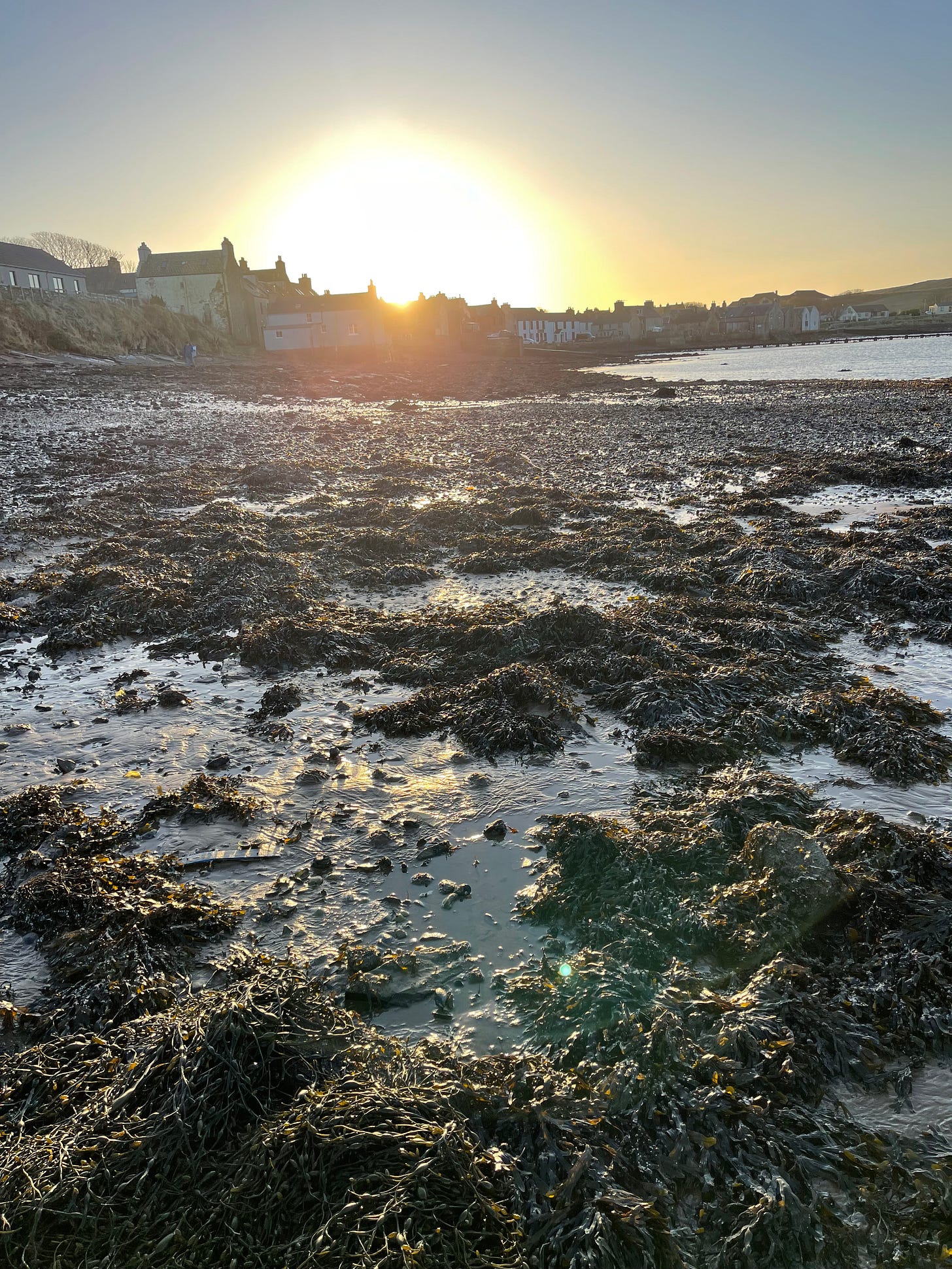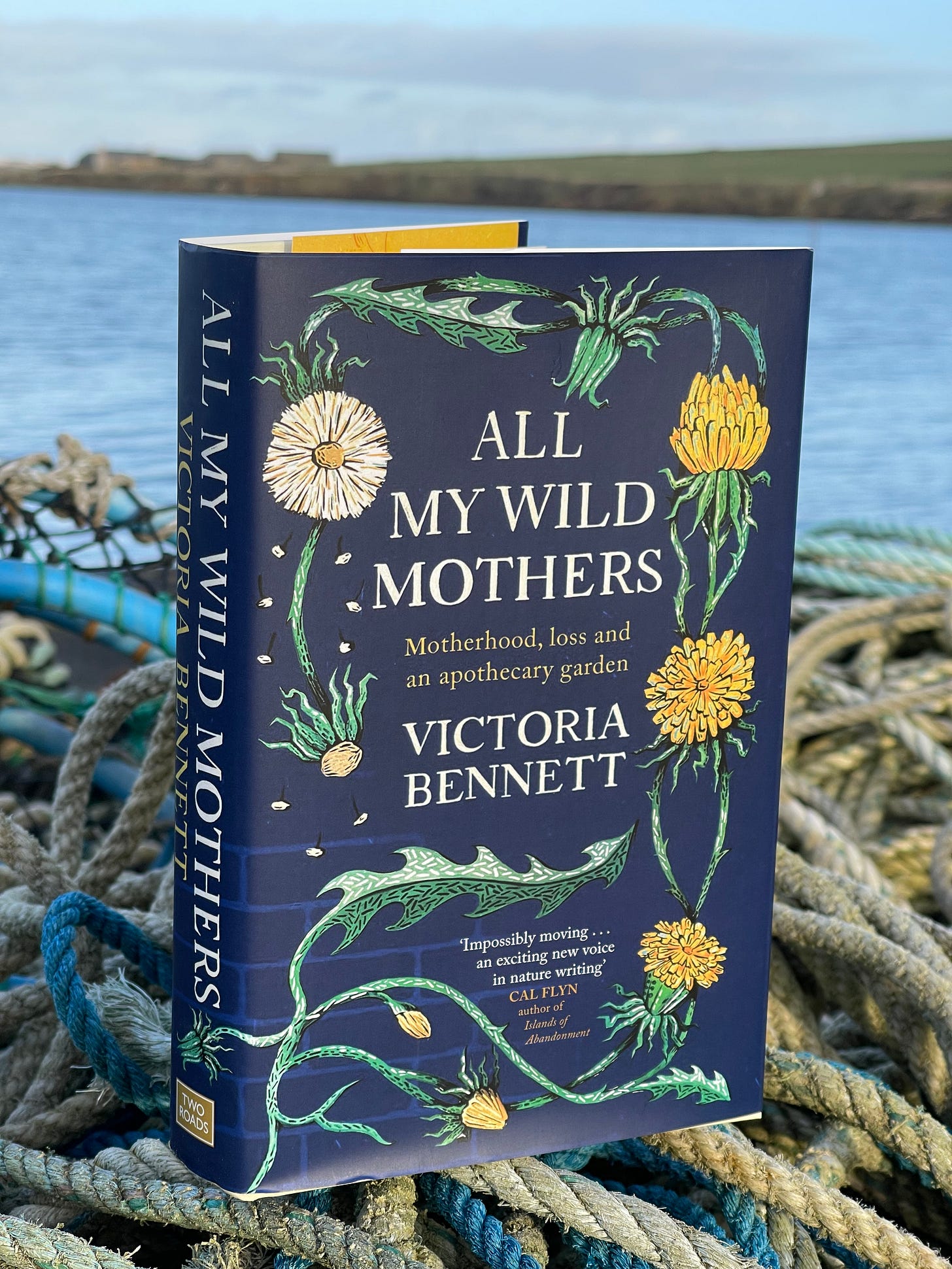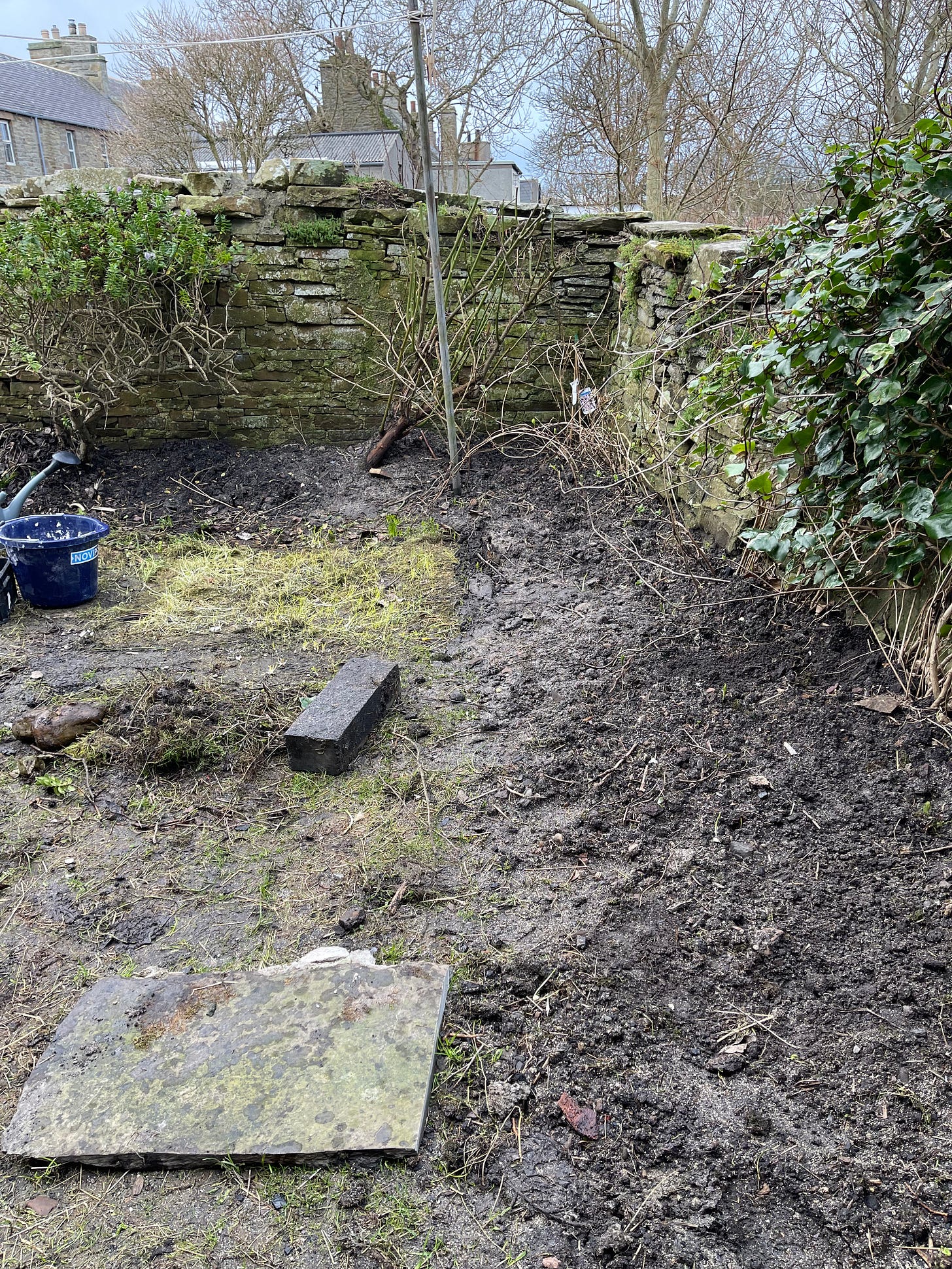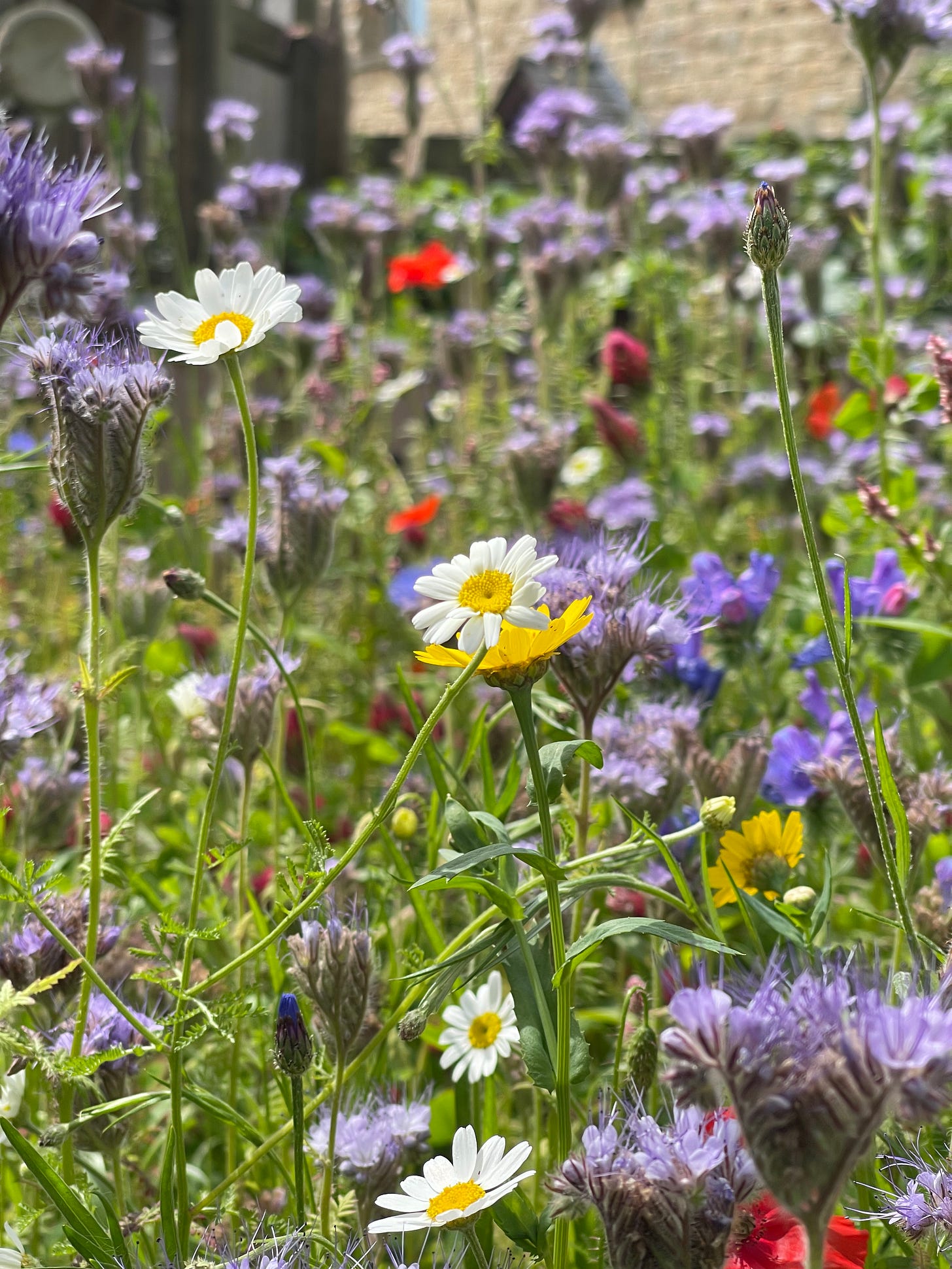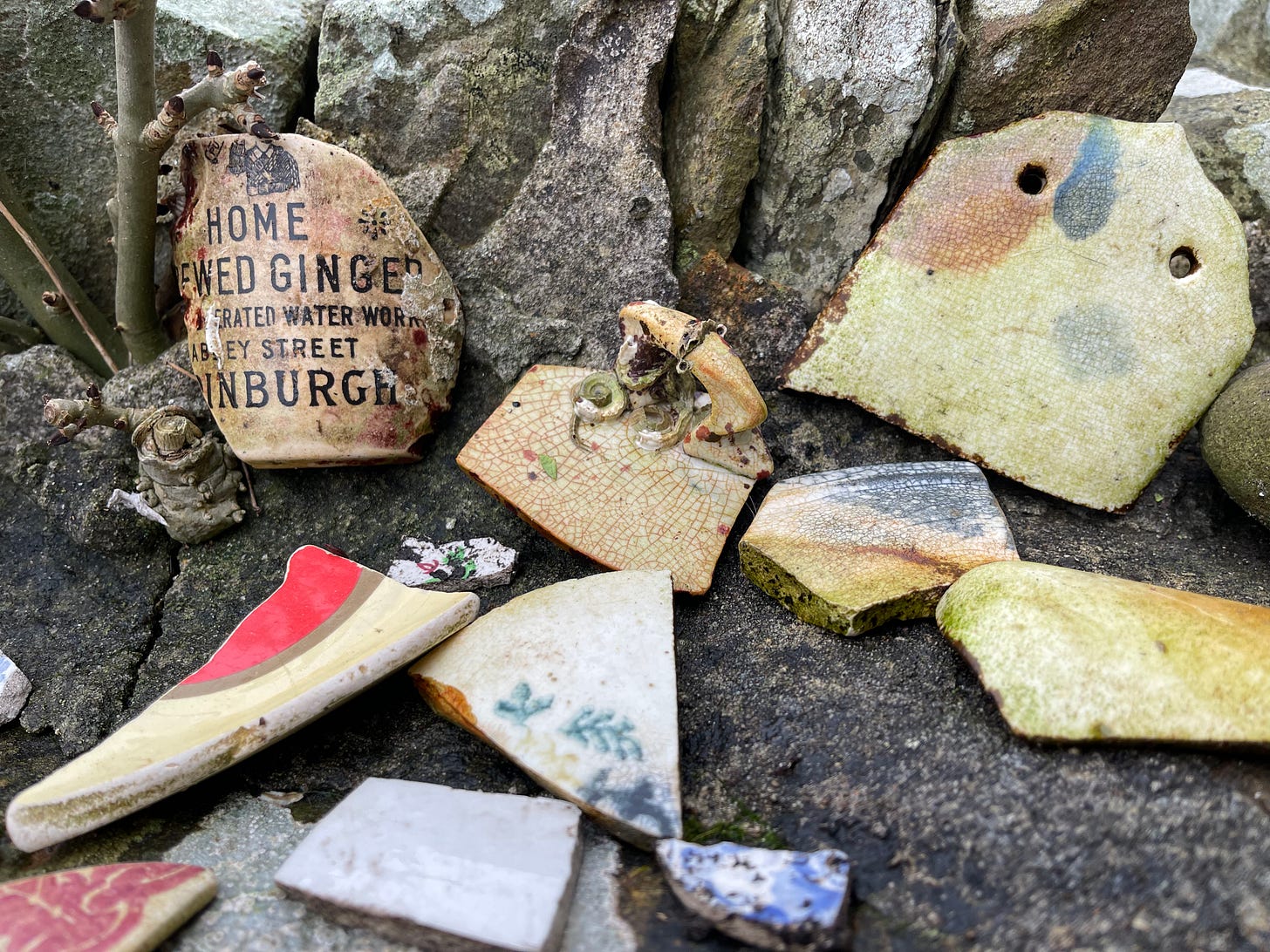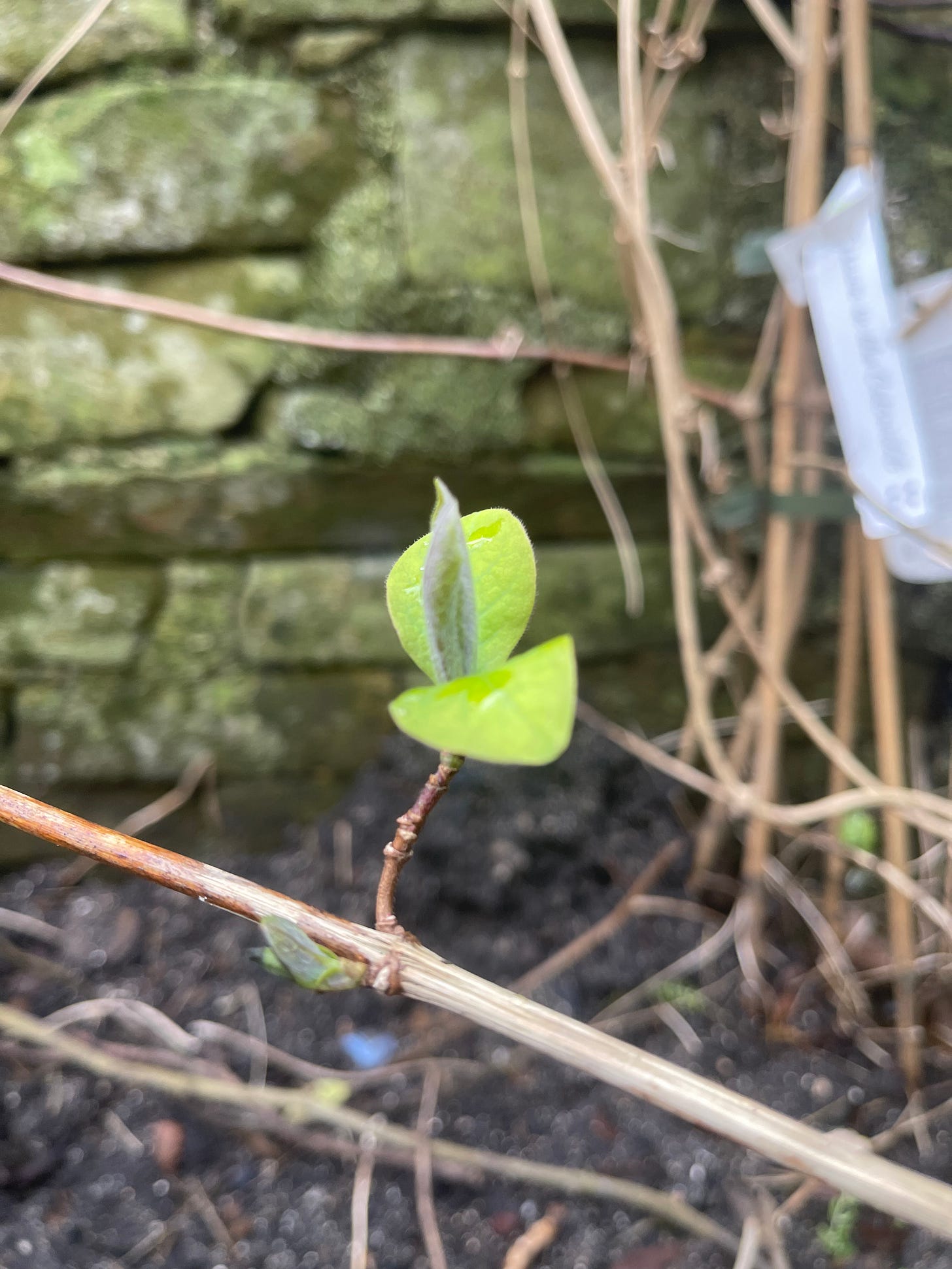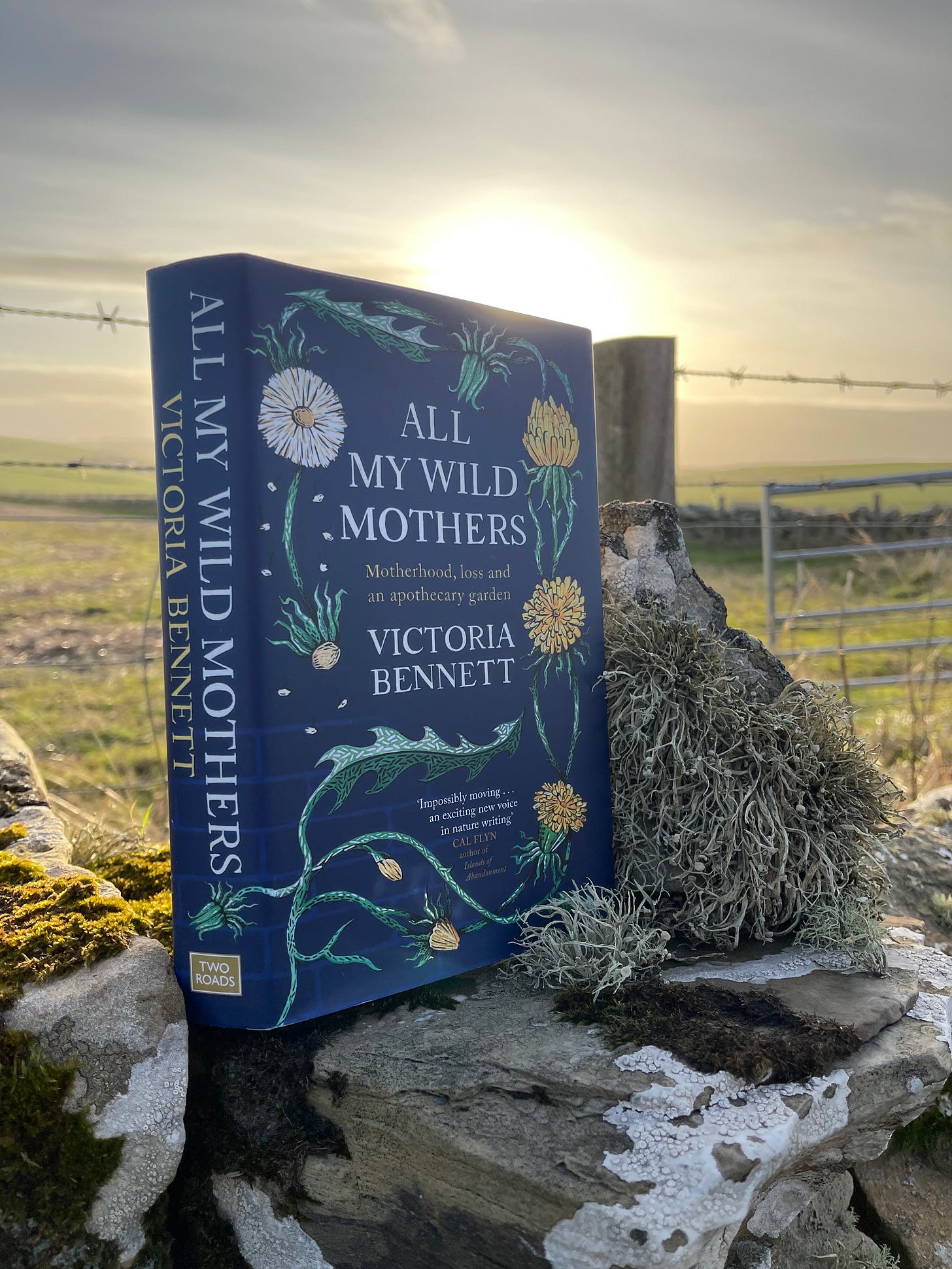Patience – is the Smile’s exertion
Through the quivering
– Emily DickinsonThe tide is low today, lower than I have seen it before. I walk down towards the water’s edge, the cat at my side. We step carefully beyond our normal line. Down here, amongst the places that are normally hidden, I find a broken 1920s ceramic Brunswick Blackstock jar, a glass stopper that has lost its role, and fragments of porcelain and china that gives glimpses of patterns and colour between the stones. These washed-up trinkets carry stories of what has once been whole. I gather them into my pocket to show my son. He is still amazed by what is lost and found.
When my pocket is full, I stop my walk to sit on a large, worn rock. The cat sits beside me, nudging my arm, wondering when we will move on. He wants to explore what is unknown. I want to stay here and rest in the brief sun. Above my head, three large white gulls catch the light against the blue sky, calling out a loud song. They are glad of the drop in wind, able to fly without being buffeted back into the shore. Across the bay, the Pentland ferry drops off its afternoon passengers, a steady stream of lorries churning along the harbour road, bringing supplies before the storms set in. I close my eyes, breathe in, let the diesel and salt and sea-sharp air fill my lungs; let the sound of engine and gull and wave sing. It is a moment of light and quiet, reminding me to listen, to replenish what has been worn and drained.
I am emptied out right now. I don’t think I am unusual in this. Those with chronic illness often learn to mask by pushing too hard. We demand too much of ourselves in an attempt to overcome the feeling of having not managed to do enough. And so it is with me now. All the years of quiet writing, the gestating and growing. I have birthed the book into the world, carrying all that is precious and loved from my life. And then … it is done. This thing that has been cradled and held close, kept safe and nurtured, is out in the world, and there is a strange grief in letting it go. It is no longer mine.
Just as I did after birth, I have felt lost, adrift. ‘Do something that grounds you,’ my husband says when I wake him in the dark to say I feel afraid. But my garden, the earth that gave me roots to hold on to, is gone. The new one refuses to tell me its secrets. I go outside each day, speak to it, and ask it what it wants to become. It stays silent. It is not time, it tells me. The plants I brought north struggle to thrive. My witch hazel sprouts one single blossom. I cry. Where has its blousy winter bloom gone?
An old neighbour writes to tell me that a new family have moved into our house. I slip up, calling it home, but it is not my home any more. It is theirs. I am pleased to hear they have a small child and that this new family are looking forward to ‘doing the garden’. I wonder what garden they will grow, if they will try to control it, or if they will find the meadowsweet and the scabious, and the dog daisy flowering this spring and let them grow. Maybe they will keep the blackcurrant I left hiding behind the stones and pick fat fruit just as my son and I once did? Maybe their little girl will discover a dinosaur hidden in the earth and believe in the magic of what is found. All this is good. I write back that I am happy to hear this news.
And yet, I grieve. I ache at the centre of me for the garden we grew; for the childhood that has run away, for the flowers that my mother and I planted side by side. I find myself longing for that sense of home, where the stories of my life took seed and grew. Here, I am rootless, storyless, a blow-in; temporarily adrift, like the crocosmia corms I find clinging to the seaweed shore. I pocket this strange, bulbous poppet as well. Perhaps the garden will like this offering.
Grief swells into a kind of panic. I look and cannot find anchors. Beneath my feet, the limpets and mussels cling, tenacious against the waves, slow-growing unseen, revealed by this low tide.
I need to find my stone.
I need to return to the small things that grow.
I need to give it time.
A need to push forward, and a need to be still; to let the seeds fall and trust that what will grow, will grow. I am asked what I am writing now. I stumble over the answer, unsure, feeling caught off-guard. I am writing but its seeds are still in the dark and asks for patience. I am superstitious of casting off the mulch just yet. My internal almanac warns of snow. It is not ready to show.
Just as my new life is not ready to show. I hear it whisper. Wait, it says. When it is time, you will know.
‘Moss has a magical quality. It lives where sprites and fairies, and all things hidden, exist. When the sunlight catches, it softens the drystone walls, billowing and folding its sensuous flesh over the angularity of rock, the slowest of dances between stone and spore. It appears fragile, but it is resilient and strong; given enough time, it can turn granite into soil. A nun once said to me, when I challenged the patriarchy in the Catholic Church, that change would come ‘in God’s time, not our own’. It is the same with moss.’
(Extract from ‘All My Wild Mothers: Motherhood, loss and an apothecary garden’ by Victoria Bennett - Two Roads Books 2023)
An invitation
Growing a garden, a book or a life requires time spent in the dark and time above ground. I have to learn, over and over, the patience to let go of the need to push and allow things to unfold at their own speed and in their own way. It isn’t always easy, but, like the moss and the lichen, all things happen in their own time.
Where in your life are you being asked to practice the patience of moss? How does that feel? Spend time examining moss and lichen. If you want to, I invite you to spend a while writing using moss or lichen as your prompt. See how it grows over the rock. Where has your own resilience and patience allowed you to grow and change? What does it feel like to inhabit the quietness of slow time?
Plant of the Month - Witch Hazel
Hamamelis virginiana
Tobacco Wood, Spotted Elder, Winter Bloom
(photo by Ruth Snowden)
Witch Hazel helps find hidden things and brings light and hope into dark places.
Considered a good wood for divining water and other hidden things, it was also known as a ‘wound healer’ for repairing a wounded heart. Vulnerary, antiseptic and astringent, it can be applied topically as a cream, wash or gel to treat acne, eczema, gum inflammation, haemorrhoids, sunburn, tired muscles and eyes, insect bites, bruising and post-partum soreness.
Witch hazel is shade tolerant and slow-growing, producing colourful flowers in winter months, before the leaf.
February Brew - Recover Tea
A brew for when you have stretched your energy too far
Brew Blend
Blackberry blossom or leaf
Chocolate mint
Orange slices
Starflower
Calendula
Optional shot of rooibos
Combine all the ingredients in a pot. Add boiling water and steep for at least 15 minutes. Drink hot or cold throughout the day to comfort and replenish.
*I usually use the ingredients fresh in summer and dry for use over winter, but you can also buy herbal ingredients from a range of suppliers. I use G. Baldwin & Co.
Where are my wild mothers now?
Are you reading All My Wild Mothers? Have you seen it in your local bookshop or library? I’d love to know where the seeds of our story have blown. Take a picture, post a review, tag me in your post if you can (@VikBeeWyld on Twitter and @Beewyld on Instagram), or message me here. Thank you so much for the wonderful support.
That’s all for this month. Please feel free to share Wild Woman Life, but if you do, please be lovely and remember to credit any writing or images shared to Victoria Bennett (unless otherwise shown).

